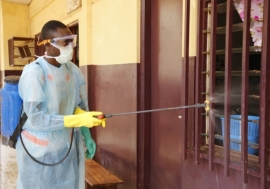Africa most affected by refugee crisis
Africa most affected by refugee crisis
As Germany, France and other European countries contend with an unprecedented influx of refugees from Syria, Iraq, Afghanistan and elsewhere, shocking tales of women and children drowning in the Mediterranean Sea are repeated over and over by media networks worldwide.
But the distress over refugees landing in Europe has overshadowed the efforts of African countries also grappling with refugee emergencies. While European nations seek to limit the “economic” refugees as opposed to asylum seekers, Ethiopia, for example, is taking in thousands of refugees from neighbouring countries.
According to the United Nations, developing countries, mostly in Africa, are taking in a disproportionate number of refugees — currently 80% of the world’s refugee population. Refugees hosted in developing countries put enormous pressure on water and health care systems in host communities.
The Office of the United Nations High Commissioner for Refugees (UNHCR) says the world is currently facing the highest levels of displacement ever in history, with an unprecedented 65.3 million people forced from their homes by war, internal conflicts, drought or poor economies. Among these are 21.3 million refugees, over half of whom are under the age of 18; the rest are economic migrants and internally displaced persons.
People are forcibly displaced at a rate of 34,000 per day due to conflict or persecution. Currently there are also 10 million stateless people worldwide who have been denied a nationality and access to basic rights such as education, health care, employment and freedom of movement.
Ethiopia’s open-door policy
Ethiopia hosts nearly 740,000 refugees, mostly from Somalia, Eritrea, Sudan and South Sudan, the largest refugee population in a single African country. The country maintains an open-door policy that welcomes refugees and allows humanitarian access and protection.
In the Central African Republic, clashes among rival groups have forced thousands to flee their homes. In Nigeria, more than 2 million people have been forcibly displaced, including the 1.87 million who have fled from the militant group Boko Haram’s violence since 2014. Some 195,350 people have sought refuge in neighbouring Cameroon, Chad and Niger.
“Refugees have skills, ideas, hopes and dreams.… They are also tough, resilient and creative, with the energy and drive to shape their own destinies, given the chance,” says UN High Commissioner for Refugees Filippo Grandi.
At Kule refugee camp in Ethiopia’s Gambella region, Nyahok Reath, a 13-year-old refugee from South Sudan, told Africa Renewal that after her country gained independence in 2011, life in the world’s newest nation was good until December 2013, when conflict was reignited. She then trekked for a week to Ethiopia with her family and little food.
“In South Sudan, we had enough to eat, school was good, and we had a lot of cows. But when war started, we had to leave everything and flee,” she said sadly. “As refugees, we do gardening here to get some money, but sometimes I have problems with food and even go to school barefoot.” The Ethiopian government, UNHCR and its partners assist South Sudanese refugees.
The young girl wants to become a pilot after watching UN aid planes take off from the airport near her home in South Sudan.
“I would like to go to different parts of the world and help people in need,” said Nyahok, who is in the seventh grade in a primary school in the camp. The school lacks 10th, 11th, and 12th grades, making Nyahok’s chances of graduating slim. Renewed fighting since July has brought the total number of South Sudanese refugees in East Africa to more than 1 million.
With a worsening refugee situation, UNHCR Assistant High Commissioner for Protection Volker Türk called in October for a global redoubling of efforts to provide refugee protection.
“The monsters in today’s world most certainly are the horrors of raging conflict, violence and human rights abuses, which people flee within or outside their countries year after year,” Mr. Türk told the UN agency’s annual executive committee of 98 countries, which met in October in Geneva.
Uganda’s best policy
Mr. Türk commended countries that continue to keep their borders open, providing refugees with opportunities to start anew. He cited Uganda’s “generous refugee law and policy regime” in response to the influx of South Sudanese refugees as an example to emulate. Uganda grants refugees free movement, employment opportunities and land for building new homes or farming.
The World Bank, the Refugees Studies Centre (an arm of the UK’s Oxford University that researches the causes and consequences of forced migration) and other organizations have praised Uganda’s refugee policy. More than 500,000 refugees from neighbouring countries, including Burundi, Democratic Republic of Congo and South Sudan, have settled in Uganda.
Humanitarian activists agree that today’s challenges are interconnected and complex, with population growth, climate change, urbanization, water scarcity and food and energy insecurity exacerbating conflicts.
UN Refugee Commissioner Grandi observed during the UNHCR’s annual executive committee meeting in Geneva in October that “people are moving more rapidly, over longer distances and for a more complex range of reasons than at any time in history.”
“Refugees have been deprived of their homes,” said UN Secretary-General Ban Ki-moon, “but they must not be deprived of their futures.” They face basic survival difficulties. On arriving in a new country, they usually need immediate shelter, food, water, medical care and security.
Last September the UN General Assembly in New York held its first-ever high-level summit to address the humanitarian needs of large numbers of refugees and migrants. Member states adopted an agreement in which they committed to providing better educational opportunities for refugee children, improving working conditions for displaced adults and fighting xenophobia.
Mr. Ban called the Declaration for Refugees and Migrants “a breakthrough in our collective efforts to address the challenges of human mobility.”
With the declaration, member states also pledged to “expand the number and range of legal pathways available for refugees to be admitted to, or resettled in, third countries,” so refugees can move more freely instead of being stuck in the first country they enter. A pledge to resettle 10% of the world’s refugees within the developed world, which had been canvassed, was excluded from the declaration.
At the same time, at the UN headquarters in New York, the leaders of Canada, Ethiopia, Germany, Jordan, Mexico and Sweden joined US President Barack Obama to host the Leaders’ Summit on Refugees. As a precondition for speaking at the summit, leaders of countries made new pledges, such as to give more support, make new admissions or give assistance to refugee host countries.
President Obama described the refugee crisis as “a test of our common humanity,” adding, “We must recognize that refugees are a symptom of larger failures—be it war, ethnic tensions, or persecution.”
While the leaders’ summit focused on refugees, not migrants, the UN General Assembly High-Level Meeting on Refugees and Migrants addressed large movements of both; the two events were complementary. Critics, however, say that the UN summits spent little time addressing the root causes of forced displacement and insecurities that force people to flee.
Many hope that incoming UN Secretary-General António Guterres, a former head of UNHCR, will be able to highlight the plight of refugees and consequently elicit more proactive interventions.
“During his 10 years at UNHCR, Mr. Guterres managed some of the biggest refugee crises of our times,” says Mr. Grandi, adding, “António Guterres was a tireless advocate for refugees, the internally displaced and the stateless, defending their rights in the field and at the highest political levels.”
Despite substantial increases in the UNHCR annual budget to meet the crises of the last five years, Mr. Grandi says funds available for 2016 so far stand at US$3.76 billion — just half of total funding requirements.



























